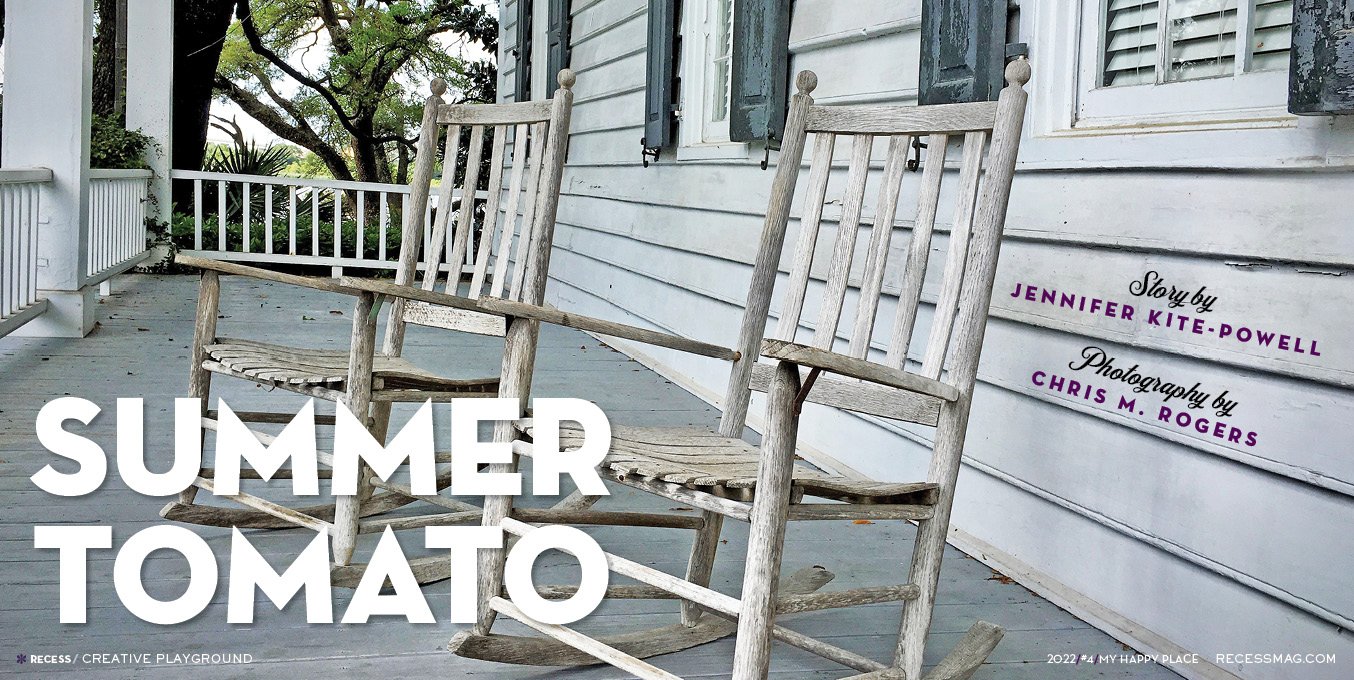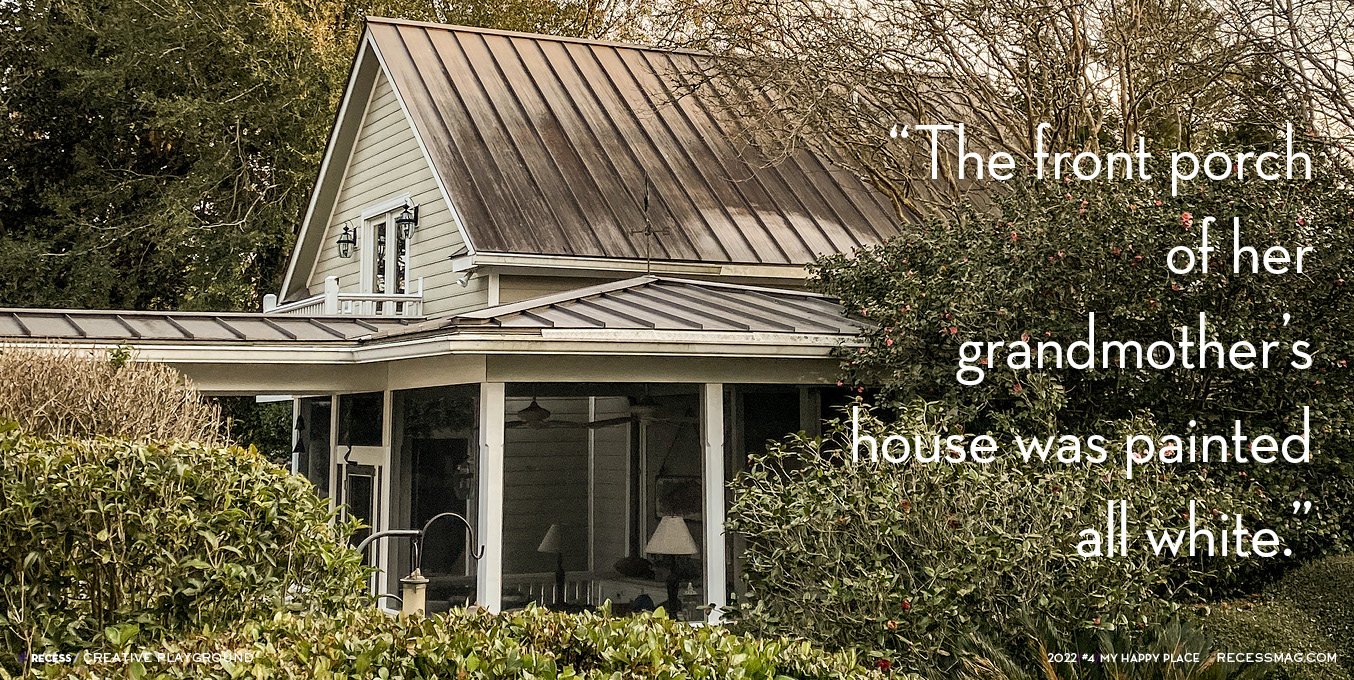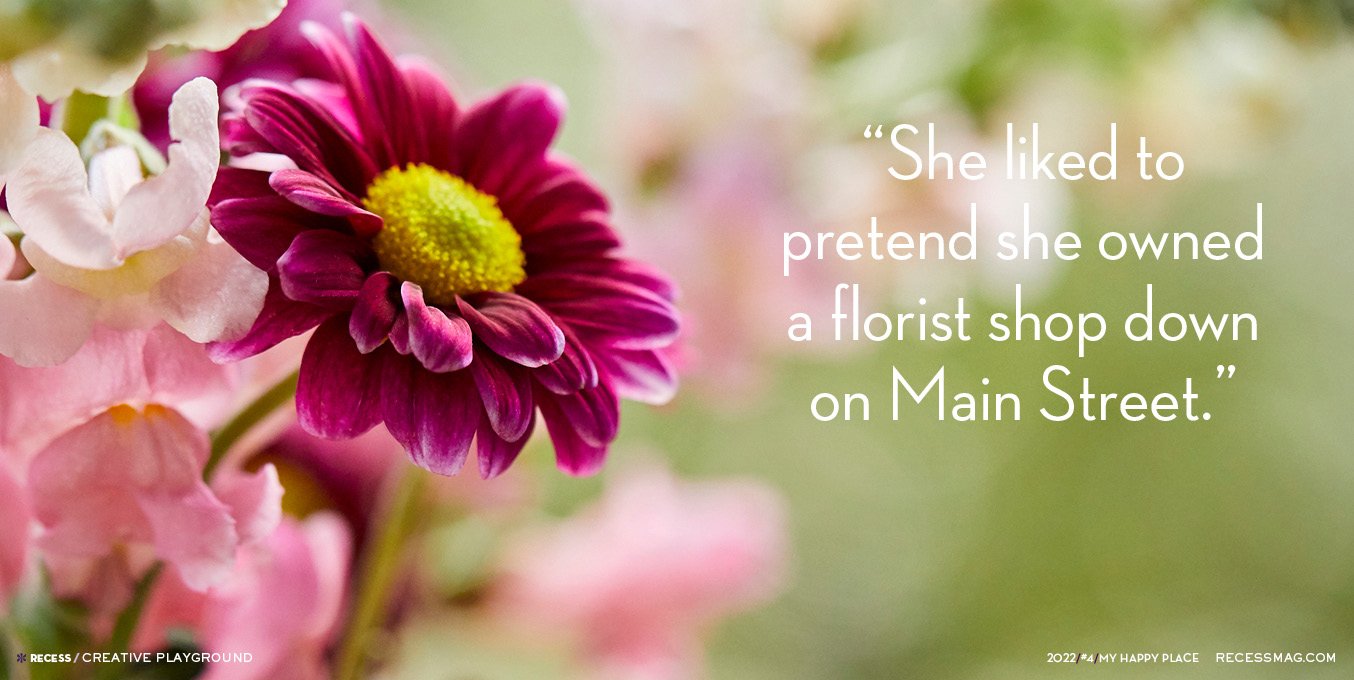Summer Tomato - Jennifer Kite-Powell
Words by Jennifer Kite-Powell
Pictures by Chris M Rogers
The front porch of her grandmother’s house was painted all white. Every year it looked whiter. In the summer, it was the whitest. The whiter it got, the dirtier she felt.
Every Saturday, she would come visit her grandmother with a bouquet of flowers she picked from her garden. It was a jumble of flowers filled with peonies, snapdragons, echinacea and daisies all tussling with each other for the best location to get the most admiration.
Looking at the bouquet she thought about how similar the daisy and echinacea were -- like two flowers that started out the same in the grand scheme of things but were transformed by their experiences. Echinacea has an edge to it, proudly shifting its fuchsia petals downward into a deformed umbrella crowned with a burnt orange textured beret - very rock-n-roll, like the Pat Benatar of flowers.
But a daisy! It was soft and innocent and lived its life in rose-colored glasses proudly parading around in pure white capped by a delicate yellow cloche hat. More like the Pollyana of flowers.
She put them all in an old mason jar and tied a string around the lip just for fun. She liked to pretend she owned a florist shop down on Main Street. She loved the idea of a florist shop on Main Street. The idea of designing her own masterpiece of flowering bundles for people who needed them. People need flowers. Doesn’t matter what your circumstance, flowers fit any occasion. Have you noticed that?
Death, send flowers. Baby is born. Send flowers. You fall madly in love, send flowers, You want to feel like you are in a Paris pied-a-terre overlooking the Seine where you fling open your shutters each morning to smell the fresh-baked croissants? Buy some flowers.
How can a florist shop be a bad thing? She was convinced it was the only way to live a happy existence - making other people happy or comforting the human race. This is why she tied the ribbon to the mason jar for her grandmother. That extra touch of special.
She stood at the threshold of her grandmother's magnificently white porch. The screen door was framed in white pine and had an iron handle which had been painted white, but you could see the bits of feisty black peeking through. Shabby chic she thought, like her flowers.
She opened the door to the squelchy sounds of metal on metal that needed an oil bath and gently uttered, “Grandma!?”
Nothing.
Sometimes her grandmother can’t hear her when she comes in via the white way. She’s back in the kitchen watching her stories on that old Sony black and white portable television. It was covered in a sticky, transparent layer of grease from all the frying she had done in that kitchen. The antenna was in fighting form except for the very tip, which was slightly tilted towards the window sill where little plastic trays of tomato seedlings were starting to sprout their tiny little heads.
She took a step into the white world with her colorful flowers beaming bits of purple, pink and yellow into the room. She smiled.
Color on white makes the white even whiter.
The last time she walked through this white passage, her grandmother told her a story about a Yankee fella from Gettysburg who was in town with a bunch of Army fellas who were passing through town. Thomson, Georgia was barely a town and a blurry, slightly erased pencil mark on the map, but since it was known as the ’Camilla City of the South’ to its 1,914 residents in the 1930s, it had understated pizzazz she used to say.
“This fella was dressed in his army uniform and stood at 6’5’’ inches tall - straight as a wooden telephone pole,” she said, leaning in to tell me the ultimate secret. “He was as lean as you’d expect from a fella of 20 after basic training in the heat of Biloxi.”
She described him as striking but not handsome. Warm but not whimpering. I asked her what this meant, and she said ‘Oh he won’t tell you what you want to hear just to make you sweet on him’.
I imagined them sitting together on that white porch before she met my grandfather. His army green uniform filled the white space like a mound of moss magically growing right smack dab in the middle of the concrete and wooden rocking chairs.
I pictured her sitting there in a pale blue dress with an A-line hem and princess sleeves neatly packaged with a white grosgrain ribbon around her long high waist. Her jet black hair pulled tightly into a low bun that rests at the very tip-top of her spine.
Blue was her favorite color. Everything she wore was based on blue. Pale blue, Breton blue, baby blue and in her later years she tossed in Prussian blue (which was renamed midnight blue because no one knows what Prussia is anymore), cadet blue (‘It’s like black’ she used to say), cerulean and cornflower blue.
She smiled as she talked about him looking off through the screen that was the thin line between the world out there and the sanctity of white porch. I never heard her mention him before and I wondered if it was the whiteness of the porch that made her reveal her longing for him.
The idea of conjuring up a memory of someone who passed through your life and placing them in a white room. The stillness that emerges from the lack of color. It was like hanging a piece of art on a wall in an art gallery or scribbling in the white space of a book which can mean everything and nothing at the same time. His memory had no bearing on her life now, but it hung on her mental wall with bittersweet melancholia.
She said he came to visit her four more times after that first visit. Each time he came to see her, he brought one single white daisy, except the last time. On that last visit to her on a humid and balmy June morning, he brought her one small blooming tomato vine in a small glass jar.
A dark green tomato vine with petite buttercup yellow flowers that would soon transform into a late summer tomato she could eat and think of him when he was gone.




